This post contains affiliate links. Please see our disclosure policy.
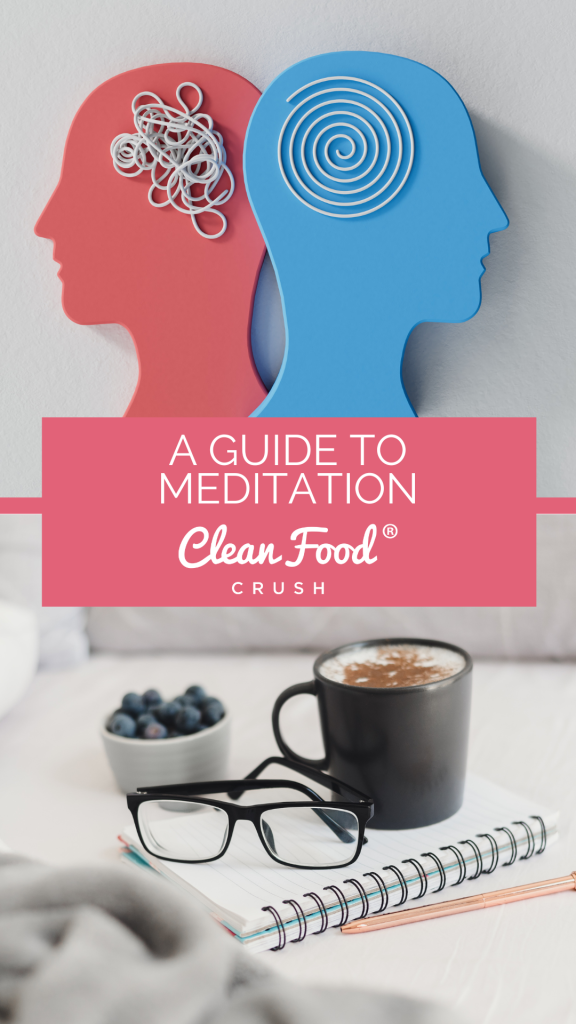
Guide to Meditation
Meditation is a relatively simple practice that utilizes a technique or specific method such as mindfulness to deepen one’s awareness, focus the mind, help calm the body, find peace, and retrain the brain.
This practice is common among modern wellness routines but has existed much longer.
We’ve mentioned meditation in passing a few times here at CleanFoodCrush, but I want to give some more information on the different practices!
Why Meditate
Mediation has many different religious and spiritual roots worldwide and in many different cultures. So, for some people, the answer to the question “Why should you meditate?” lies in their spiritual practices, such as meditating on scripture.
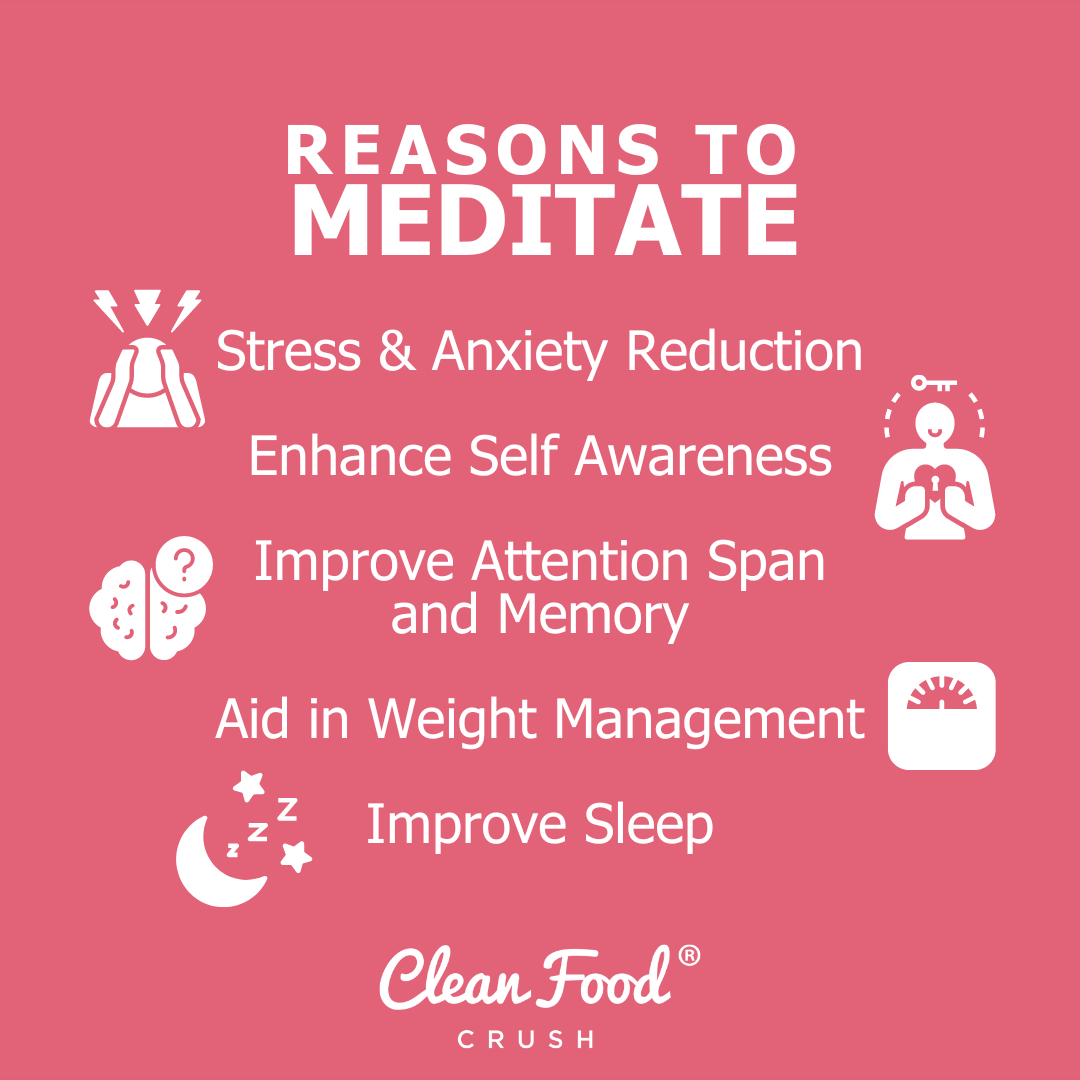
But there are several other reasons to meditate as well! This practice has proven to have many health benefits.
1. Stress & Anxiety Reduction
Science backs up the claim that meditation can help reduce stress and anxiety to bring more peace.
Meditation exercises, such as yoga, is particularly helpful in lowering anxiety levels and aiding in mental health treatments for conditions such as depression.
One study showed that mindfulness (a type of meditation) effectively reduced the inflammatory response caused by stress, and others explored how the practice improves other stress-related symptoms such as IBS, PTSD, and fibromyalgia.
2. Enhance Self Awareness
Emotional intelligence, the ability to perceive, understand, manage, and handle emotions, is important for having a solid understanding of yourself and healthy relationships with others.
Decent self-awareness is essential for growing into the best version of yourself.
Meditation can aid in recognizing harmful thoughts or negative patterns you may find in yourself.
If you want to break bad habits or create good ones, it is a great idea to enhance your awareness and thought habits so you can steer them to more constructive patterns.
3. Improve Attention Span and Memory
Meditation is the act of focusing the mind, and the practice is similar to working out.
You’re exercising your mind muscles and building strength and endurance for your attention and memory.
This process can lengthen your attention span and heighten your ability to redirect attention.
Several studies have shown that when people practice different types of meditation, their attention improves, they are more accurate when completing tasks, worry and get distracted less, perform better on neuropsychological tests, and have much better memory retention.
4. Aid in Weight Management
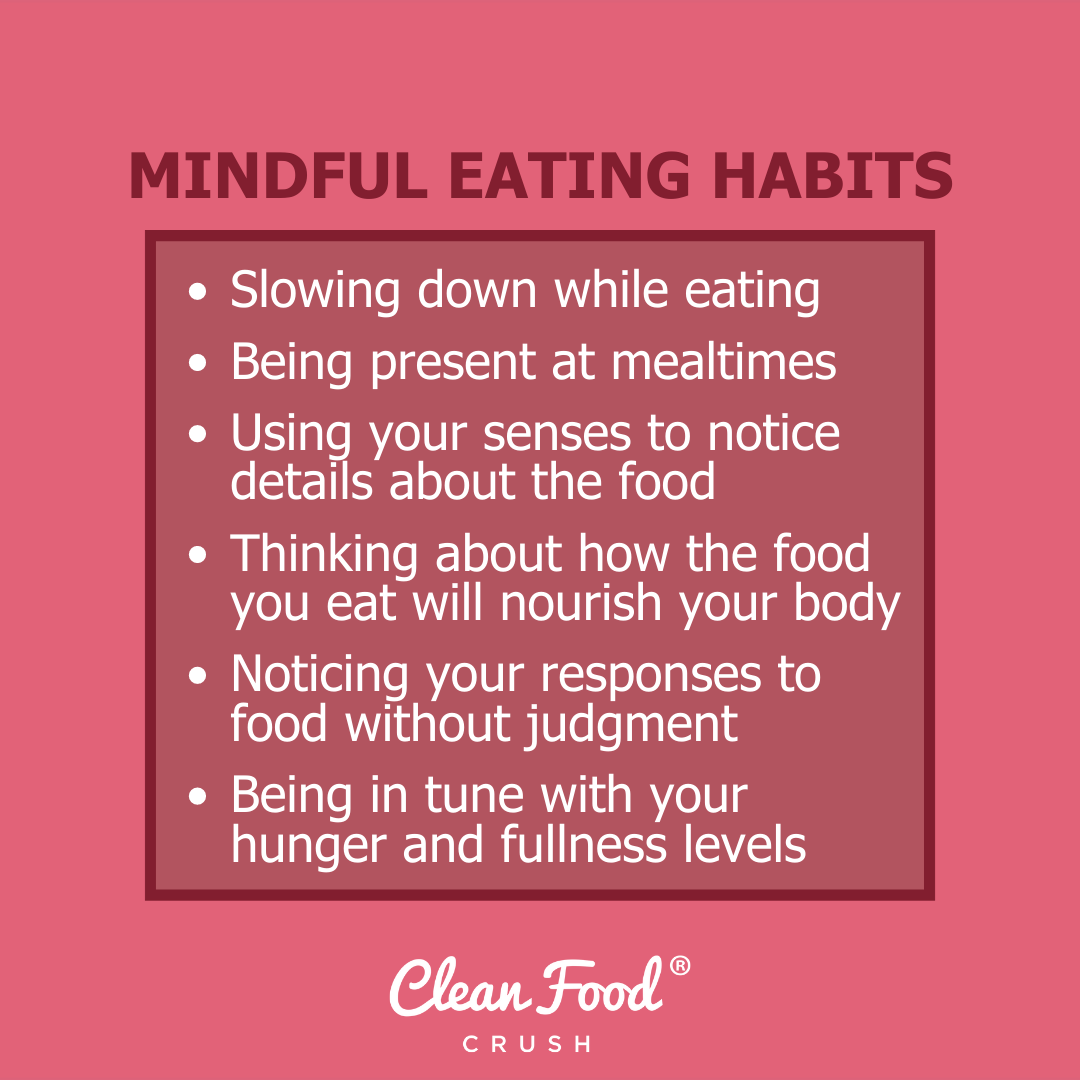
The mental discipline developed through meditation practices may help break bad habits and increase awareness of triggers for addictive behaviors.
Similarly, a stronger, more focused, and aware brain means you are much more likely to recognize and manage destructive impulses and cravings, including food cravings.
A review of 14 studies concluded that participants who practiced mindfulness had large reductions in emotional and binge eating, which can both contribute to weight gain.
With better self-control and craving management, you can make healthier food decisions and, consequently, lose or maintain an ideal weight.
Additionally, meditation can aid in decreasing blood pressure and reducing strain on the heart and arteries.
5. Improve Sleep
Sleep is a vital aspect of health and something we often discuss at CleanFoodCrush.
There are several ways to improve sleep, one of which is practicing meditation.
People who practice meditation are more likely to have sufficient and high-quality sleep and less likely to suffer from insomnia or sleep deprivation.
This is primarily due to the reduced stress and increased relaxation that comes with the practice.
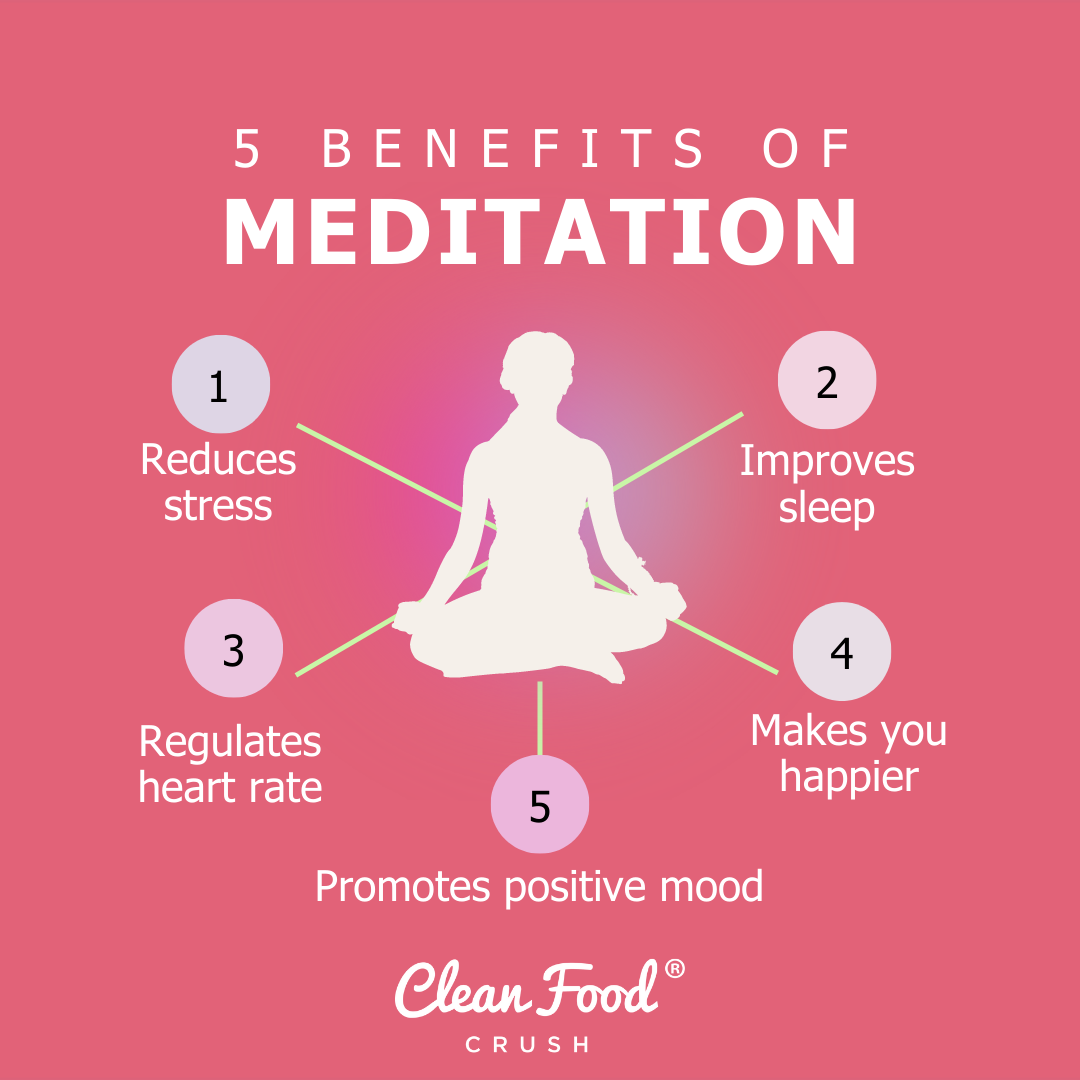
ALRIGHT, now that we’ve discussed why meditation is a good practice, let’s discuss the different types to try!
Types of Meditation
Mindfulness Meditation
This type of meditation is based on being mindful or broadening your conscious awareness and acceptance of living in the moment through utilizing all your senses and training your thoughts to stay on topic.
Slightly more so than other types, with this form of meditation, you are fully focusing on the actual process and experience, such as by following the flow of your breath, observing your own emotions and thoughts, pinpointing sensations in your body, and more white also allowing these to happy and pass without judgment.
Some ways to do this include journaling and exercises such as the 5-4-3-2-1 technique, a common anxiety coping mechanism meant to help you ground yourself. Through this, you identify things using your 5 senses.
-
Acknowledge FIVE things you see: a pen, a stain on the carpet, or an oddly shaped leaf.
-
Acknowledge FOUR things you feel: a blanket, an ache in your back, or the ground under your feet.
-
Acknowledge THREE things you hear: our stomach rumbling, the wind whistling, or a family member laughing in another room.
-
Acknowledge TWO things you can smell: pencil, your shampoo, or anything in nature around you.
-
Acknowledge ONE thing you can taste: gum, a hint of coffee you had that morning, or can you taste the scents outside?
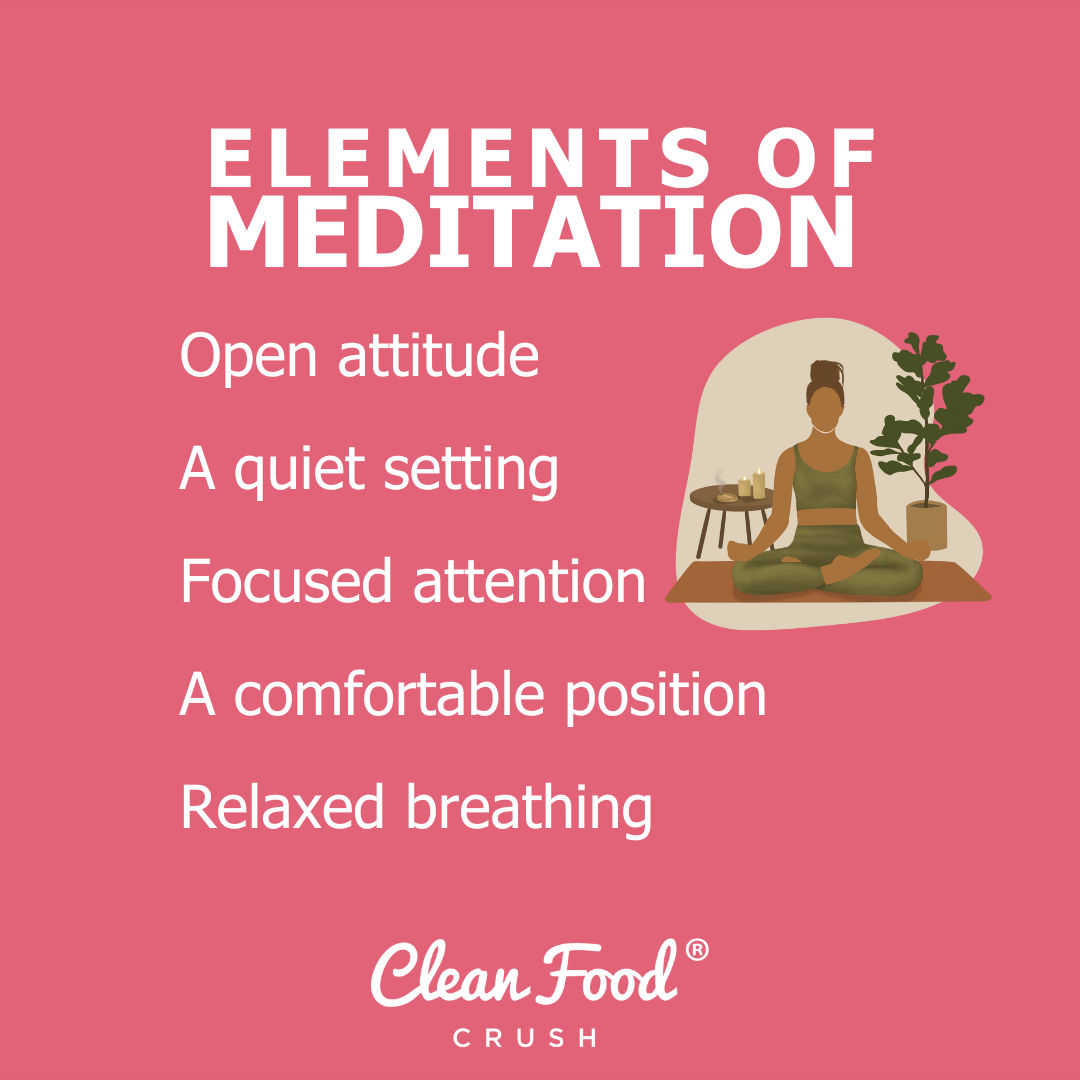
Guided Meditation
This method, sometimes called guided imagery or visualization, includes forming mental images of soothing situations or places to relax.
Typically, you will follow a guide someone else wrote/gave you, whether through a teacher, podcast, book, or something else entirely.
Like with mindfulness, you’ll want to try and use as many senses as possible to be fully present in the moment.
Poems, religious texts, music, and more can also be a guide that helps you reflect on the meanings or find relaxation and inspiration. Try also writing your thoughts on these references in a journal!
Meditative Movement
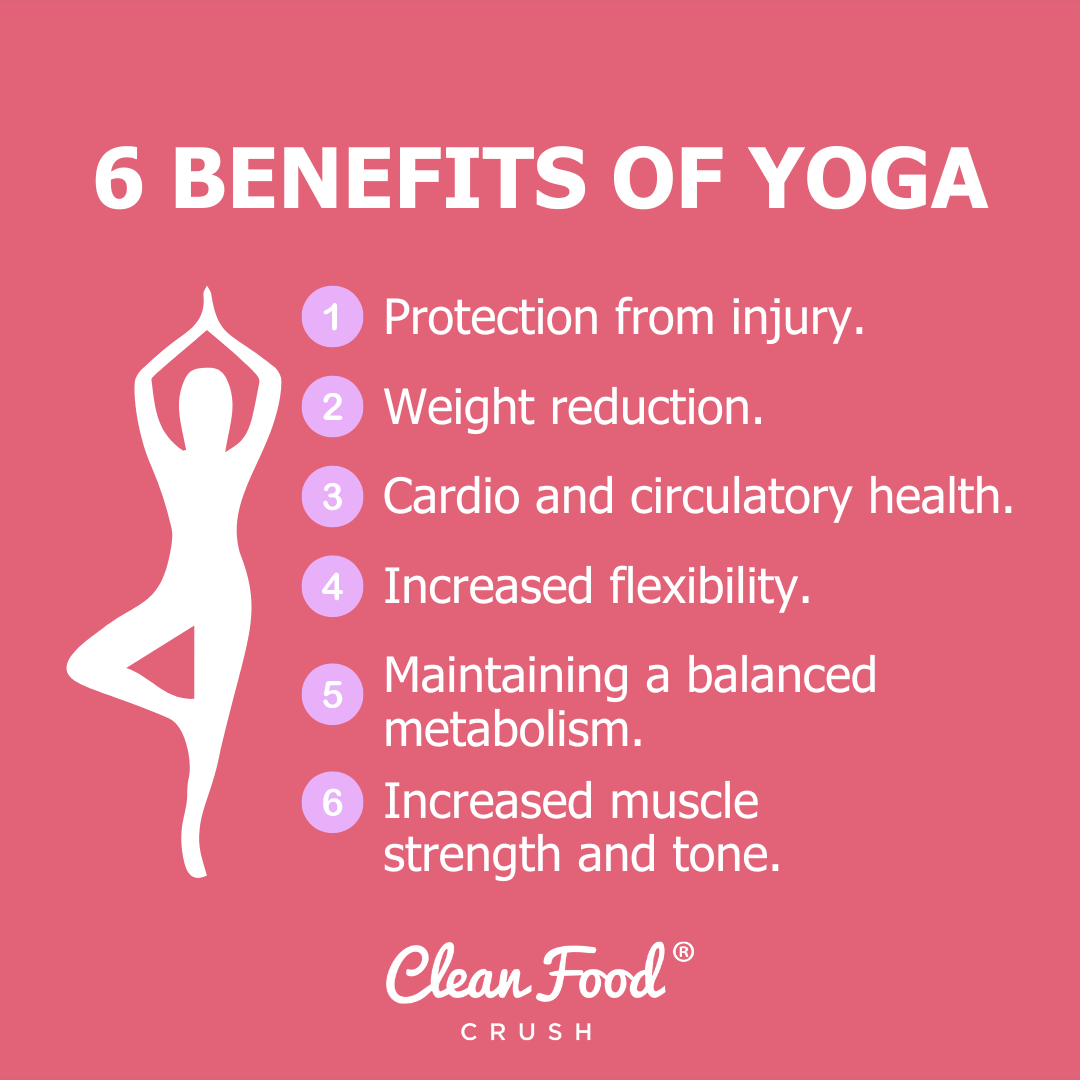
These include combining the mental aspect of meditation with physical exercises such as yoga, Thai Chi, dance, or walking.
Yoga includes performing a series of postures and controlled breathing exercises to promote a more flexible body and a calm mind.
Thai Chi is a Chinese martial arts training in which you perform a self-paced series of postures or movements slowly and gracefully while practicing deep breathing.
You can find guided practices for these online, on Youtube, or through in-person classes.
Combining a walk with meditation is very efficient and healthy and can be done almost anywhere, from your neighborhood to a city sidewalk to a tranquil state park.
Don’t think about the destination when deliberately walking for relaxation and meditation. Instead, concentrate on the actual process of your legs and feet lifting and propelling you forward and your lungs working, and the sights and scents around you.
When using movement-based meditation, be sure to scan your body!
Become aware of the various sensations you feel and pair that scanning with breathing exercises to help relax your muscles.
Mantra Meditation
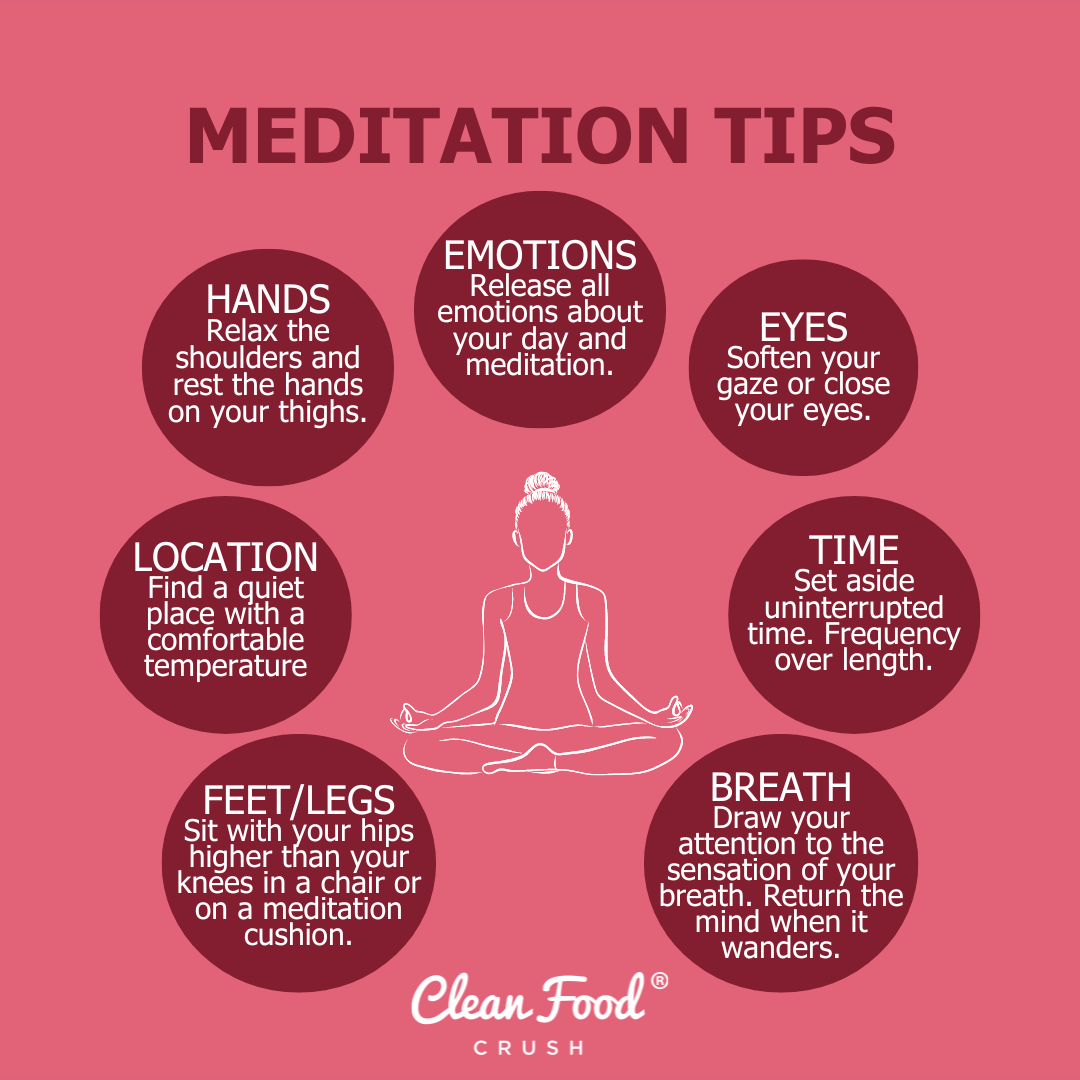
Also called transcendental meditation, with this exercise, you silently repeat a calming word, thought, or phrase to prevent distracting thoughts.
Try assigning yourself a personal mantra that allows your body to settle into relaxation. This can also help you believe the phrase, as speaking things out loud can be powerful.
Engaging in prayer can also be a form of mantra meditation. Many faith traditions include spoken and written prayers, made out of your words or through those written by others.
Check out your local bookstore for self-help books or religious texts, or talk to your rabbi, pastor, priest, or other spiritual leader for suggested resources.
There is no singular perfect way to meditate, and several types tend to overlap and use similar processes. This is by no means a comprehensive list of different kinds of meditation, but it’s a great place to start!
Whether you’re a beginner or have been meditating for years, give yourself grace, and don’t judge yourself!
Meditation takes practice and time, just like any other good habit or exercise.
What matters is that this process helps you reduce your stress and feel better overall!
Let me know your favorite way to relax or practice meditation in the comments below!


















